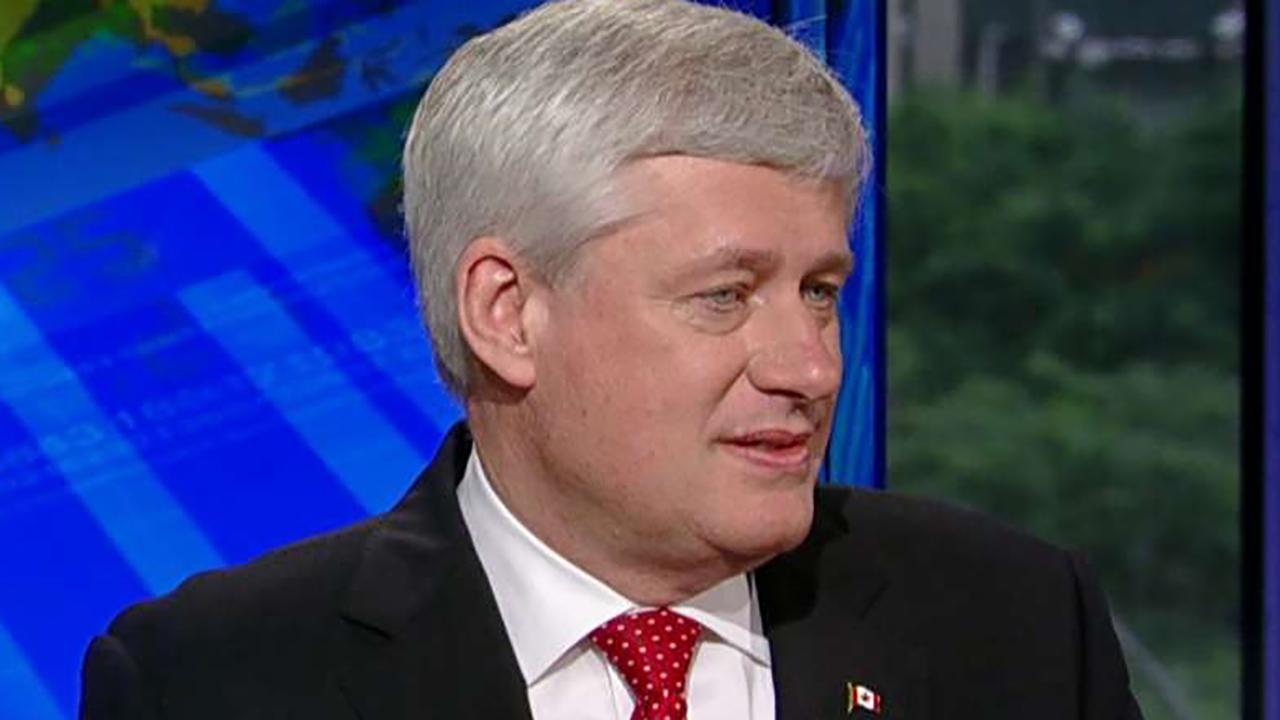Trump trade beef with Canada: Former Canadian prime minister weighs in
Former Canadian Prime Minister Stephen Harper said Sunday he is unsure why the Trump administration is heavily focused on trade relations with Canada, being that the northern neighbor is one of the strongest allies of the U.S.
“Not only is the trade deficit with Canada small, the United States runs a current account surplus with Canada,” Harper, who served as head of state from 2006 to 2015, told “Sunday Morning Futures.” “Canada is the biggest single purchaser of U.S. goods and services in the world – it’s not China, it’s not Mexico, it’s not Britain, it’s not Germany. It’s Canada. So it just seems to me this is the wrong target.”
The U.S. had a $17.5 billion goods trade deficit with Canada – its second-largest goods trading partner – in 2017, though it did have a goods and services trade surplus of $8.4 billion last year with its fellow North American Free Trade Agreement (NAFTA) member, according to data from the U.S. Trade Representative’s office.
“This is a more or less balanced relationship and one that’s vitally important to businesses and consumers on both sides of the border, and one that Trump supporters have no problem with,” the former prime minister noted.
However, Harper, a conservative, said he understands why President Donald Trump believes the U.S. needs better trade relationships with China and aspects of the country’s trade relationship with Mexico, particularly its auto sector.
“I think in the case of the auto sector, I worked with the Bush and Obama administrations to help bail out that sector during the global financial crisis,” Harper said. “Then the sector starts moving to Mexico. I think that’s a concern we both share. But I don’t see any fundamental problem in the Canadian-American trade relationship.”
In addition to Canada, China and Mexico make up America’s top three trading partners. The U.S. has a near-$350 billion goods trade deficit with China and a goods trade deficit with Mexico of slightly more than $71 billion, according to the Trade Representative’s office.
Tensions between the two allies increased following the Group of Seven summit in Quebec this weekend, when Trump met with leaders of Canada, Britain, Italy, France, Germany and Japan to discuss economic issues facing the nations, including trade relations. Before departing the conference, Trump warned countries not to retaliate against U.S. tariffs on imported steel and aluminum.
Canadian Prime Minister Justin Trudeau shot back at Trump’s comments at a press conference Saturday by saying Canadians “did not take lightly” that the American tariffs were introduced on a basis of national security, and that they would not be “pushed around.” In response to U.S. duties, Canada has already issued its own tariff threats, which Trudeau said would go into effect on July 1.
Continuing the back-and-forth exchange of words, Trump lashed out at the Canadian leader on Twitter, calling him “very dishonest and weak,” and his statements “false.”
“PM Justin Trudeau of Canada acted so meek and mild during our @G7 meetings only to give a news conference after I left saying that, “US Tariffs were kind of insulting” and he “will not be pushed around.” Very dishonest & weak. Our Tariffs are in response to his of 270% on dairy!” Trump tweeted.
Peter Navarro, a White House trade adviser, also slammed the Canadian prime minister, telling “Fox News Sunday” there is a “special place in hell” for leaders like Trudeau.
"There's a special place in hell for any foreign leader that engages in bad faith diplomacy with President Donald J. Trump and then tries to stab him in the back on the way out the door," Navarro said. "And that's what bad faith Justin Trudeau did with that stunt press conference. That's what weak, dishonest Justin Trudeau did. And that comes right from Air Force One."




















